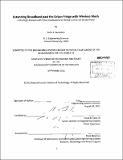| dc.contributor.advisor | Frank R. Field, IlIl. | en_US |
| dc.contributor.author | Berkoben, Keith A. (Keith Alexander) | en_US |
| dc.contributor.other | Massachusetts Institute of Technology. Technology and Policy Program. | en_US |
| dc.coverage.spatial | f-ke--- | en_US |
| dc.date.accessioned | 2012-02-29T17:58:25Z | |
| dc.date.available | 2012-02-29T17:58:25Z | |
| dc.date.copyright | 2011 | en_US |
| dc.date.issued | 2011 | en_US |
| dc.identifier.uri | http://hdl.handle.net/1721.1/69480 | |
| dc.description | Thesis (S.M. in Technology and Policy)--Massachusetts Institute of Technology, Engineering Systems Division, Technology and Policy Program, 2011. | en_US |
| dc.description | Cataloged from PDF version of thesis. | en_US |
| dc.description | Includes bibliographical references (p. 114-119). | en_US |
| dc.description.abstract | As the competitive wholesale cost of bandwidth continues to plummet in Kenya, last-mile networks have become a bottleneck in the extension of affordable broadband outside major cities. In this work we explore the business case for small-scale wireless mesh networks as a means to implement demand-driven, bottom-up growth of broadband infrastructure on the outskirts of Nairobi, Kenya. Under the hypothesis that current conditions are not attractive to small scale operators (SSO), we develop a continuous growth model to understand the investment required by a SSO before a small-scale network is able to grow sustainably. The model is then used to test the effects of a variety of policy interventions on the SSO's required investment. Our analysis reveals that the two primary barriers for SSOs are license fees and inability to access market prices for upstream inputs at prices competitive with large commercial operators. Based on these results we propose government support for a SSO cooperative as an efficient method of supporting small-scale wireless networks and their operators. | en_US |
| dc.description.statementofresponsibility | by Keith A. Berkoben. | en_US |
| dc.format.extent | 119 p. | en_US |
| dc.language.iso | eng | en_US |
| dc.publisher | Massachusetts Institute of Technology | en_US |
| dc.rights | M.I.T. theses are protected by
copyright. They may be viewed from this source for any purpose, but
reproduction or distribution in any format is prohibited without written
permission. See provided URL for inquiries about permission. | en_US |
| dc.rights.uri | http://dspace.mit.edu/handle/1721.1/7582 | en_US |
| dc.subject | Engineering Systems Division. | en_US |
| dc.subject | Technology and Policy Program. | en_US |
| dc.title | Extending broadband past the urban fringe with wireless mesh : a strategic analysis with policy implications for Kenya's Universal Service Fund | en_US |
| dc.type | Thesis | en_US |
| dc.description.degree | S.M.in Technology and Policy | en_US |
| dc.contributor.department | Massachusetts Institute of Technology. Engineering Systems Division | |
| dc.identifier.oclc | 775595210 | en_US |
